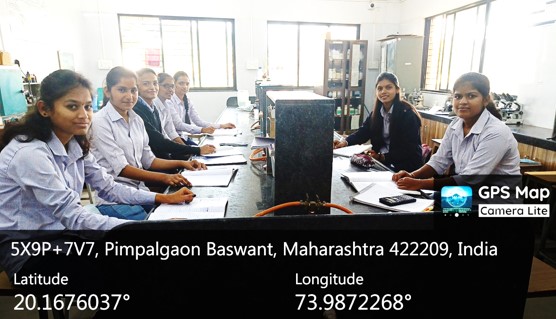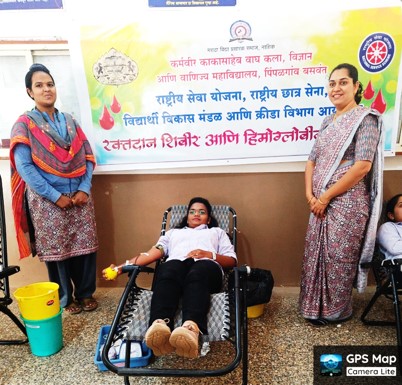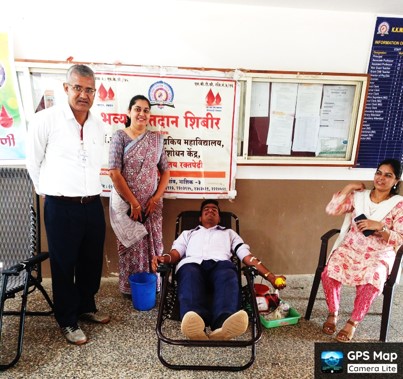Department of Microbiology
Scope of Microbiology
- Microorganisms are present everywhere on earth which includes humans, animals, plants and other living creatures, soil, water and atmosphere.
- Microbes can multiply in all three habitats except in the atmosphere. Together their numbers far exceed all other living cells on this planet.
- Microorganisms are relevant to all of us in a multitude of ways. The influence of microorganism in human life is both beneficial as well as detrimental also.
- For example microorganisms are required for the production of bread, cheese, yogurt, alcohol, wine, beer, antibiotics (e.g. penicillin, streptomycin, chloromycetin), vaccines, vitamins, enzymes and many more important products.
- There is vast scope in the field of microbiology due to the advancement in the field of science and technology.
- The scope in this field is immense due to the involvement of microbiology in many fields like medicine, pharmacy, diary, industry, clinical research, water industry, agriculture, chemical technology and nanotechnology.
- The study of microbiology contributes greatly to the understanding of life through enhancements and intervention of microorganisms. There is an increase in demand for microbiologists globally.
- Genetics: Mainly involves engineered microbes to make hormones, vaccine, antibiotics and many other useful products for human being.
- Agriculture: The influence of microbes on agriculture; the prevention of the diseases that mainly damage the useful crops.
- Food science: It involves the prevention of spoilage of food and food borne diseases and the uses of microbes to produce cheese, yoghurt, pickles and beer.
- Immunology: The study of immune system which protect the body from pathogens.
- Medicine: deals with the identification of plans and measures to cure diseases of human and animals which are infectious to them.
- Industry: it involves use of microbes to produce antibiotics, steroids, alcohol, vitamins and amino acids etc.
Agricultural microbiology – try to combat plant diseases that attack important food crops, work on methods to increase soil fertility and crop yields etc. Currently there is a great interest in using bacterial or viral insect pathogens as substitute for chemical pesticides.
Microbial ecology – biogeochemical cycles – bioremediation to reduce pollution effects
Food and dairy microbiology – try to prevent microbial spoilage of food and transmission of food borne diseases such as botulism and salmonellolis. Use microorganisms to make foods such as cheese, yogurt, pickles and beers.
Industrial microbiology – used to make products such as antibiotics, vaccines, steroids, alcohols and other solvents, vitamins, amino acids and enzymes.
Microbial physiology and Biochemistry – study the synthesis of antibiotics and toxins, microbial energy production, microbial nitrogen fixation, effects of chemical and physical agents on microbial growth and survival etc.
Microbial genetics and Molecular biology – nature of genetic information and how it regulated the development and function of cells and organisms. Development of new microbial strains that are more efficient in synthesizing useful products.
Genetic engineering – arisen from work of microbial genetics and molecular biology. Engineered microorganisms are used to make hormones, antibiotics, vaccines and other products. New genes can be inserted into plants and animals.
Applications of Microbiology
- Microbiology is one of the largest and most complex of the biological sciences as it deals with many diverse biological disciplines.
- In addition to studying the natural history of microbes, it deals with every aspects of microbe-human and environmental interaction. These interactions include: ecology, genetics, metabolism, infection, disease, chemotherapy, immunology, genetic engineering, industry and agriculture.
The environment:
- Microbes are responsible for the cycling of carbon, nitrogen phosphorus (geochemical cycles)
- Maintain ecological balance on earth
- They are found in association with plants in symbiotic relationships, maintain soil fertility and may also be used to clean up the environment of toxic compounds (bio-remediation).
- Some are devasting plant pathogens, but others act as biological control agents against these diseases.
Medicine:
- Disease causing ability of some microbes such as
- Small Pox (Variola virus)
- Cholera (Vibrio cholera)
- Malaria (Plasmodium, protozoa) etc.
- They have also provided us with the means of their control in the form of antibiotics and other medically important drugs.
Food:
- Microorganisms have been used to produce food, from brewing and wine making, through cheese production and bread making, to manufacture of soy sauce.
- Microbes are also responsible for food spoilage.
Biotechnology:
- Commercial applications include the synthesis of acetone, organic acids, enzymes, alcohols and many drugs.
- Genetic engineering – bacteria can produce important therapeutic substances such as insulin, human growth hormone, and interferon.
Research:
- Because of their simple structure they are easier to study most life processes in simple unicellular organisms than in complex multicellular ones.
- Millions of copies of the same single cell can be produced in large numbers very quickly and at low cost to give plenty of homogenous experimental material.
- Because they reproduce very quickly, they are useful for studies involving the transfer of genetic information.
| Sr. No. | Name | Smt. K. S. Kunde |
|
| 1. | Designation | Head, Assistant Professor | |
| Qualification | M.Sc. | ||
| e-mail id | kskunde@mvpkkwcollege.ac.in | ||
| Experience | 12 years | ||
| Area of Interest | Immunology and Medical Microbiology | ||
| 2. | Name | Smt S. P. Khatal |
|
| Designation | Assistant Professor | ||
| Qualification | M.Sc. | ||
| e-mail id | spkhatal@mvpkkwcollege.ac.in | ||
| Experience | 09 Years | ||
| Area of Interest | Fermentation and Genetics | ||
| Name | Smt. P. V. Birari |
| |
| 3. | Designation | Assistant Professor | |
| Qualification | M.Sc. B.Ed | ||
| e-mail id | pbbirari@mvpkkwcollege.ac.in | ||
| Experience | 03 years | ||
| Area of Interest | Agriculture microbiology and Metabolism | ||
| 4. | Name | Miss. T. A. Nirgude |
|
| Designation | Assistant Professor | ||
| Qualification | M.Sc. | ||
| e-mail id | tanirgude@mvpkkwcollege.ac.in | ||
| Experience | 03 Years | ||
| Area of Interest | Molecular Biology and Microbial Systematics |
| Sr. No. | Course Name | Start Year | Duration (Years) | Type | Intake Capacity |
| 1 | B.Sc. | 2009-10 | 3 | Full Time | 120 |
| 2 | M.Sc. | 2021-22 | 2 | Full Time | 24 |

| Sr. No. | Name of student | Position | Package | Name of the Employer |
| 1. | Joshi Rushikesh Nandakumar | Apprentice | 2 lakh\annum | Intas Pharmaceuticals Limited, Pune |
| 2. | Mahale Roshan Subhash | Quality Control Officer | 2.40 lakh\annum | Bharat Serum and Vaccines Limited Mumbai |
| 3. | Lokhande Amol Balasaheb | Quality Control Officer | 2.40 lakh\annum | Bharat Serum and Vaccines Limited Mumbai |






